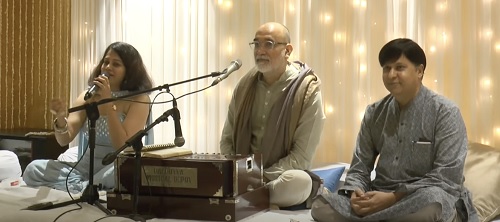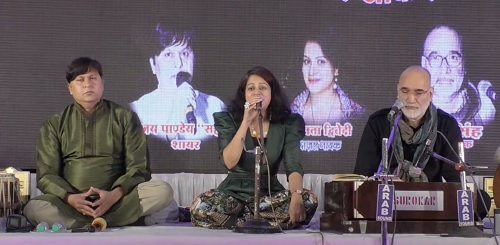Words of Rhyme and Reason
By C. Naseer Ahmad

“Reach out and touch someone,” was a years-long commercial of the telecommunications behemoth AT&T, sometimes called Ma Bell, which used human emotions very successfully to make people use the telephone lines and thus bringing in riches for the company. Foreign students like this writer didn’t need much coaching from this company or anyone to talk to our loved ones in faraway home countries. Calling parents and other loved ones and hearing their voices really felt like we had touched each other.

Fast forward few decades, we still might not be able to touch loved ones in faraway places, but we can see their faces and virtually be in each other’s rooms - courtesy of modern technologies like Skype, Teams, and Zoom.

Looking back, it is not technology but simple words that have enabled us to touch someone more than doing so physically. The words of poets are especially powerful in touching the human beings’ essence – our souls.
Among my favorite poets is Pablo Neruda of Chile who began writing poems at 13 and won the Nobel Peace Prize in 1950. He was known for his love poems.
Back home, Faiz Ahmad Faiz is a poet who continues to touch, from the heavens above, millions of souls for several generations. Though he did not get the Nobel Peace Prize, he won something more important, my late father’s heart. Ever since I was a little boy, I watched my father sing “Mujh sey pehle see muhabbat mere Mehboob na maang” as he was getting ready for breakfast. The words of Faiz touch me every morning and every time I hear someone sing this poem, and through, it I get to touch my beloved father’s soul.
In the 1970s when I was coming of age as a graduate engineering student in US, my fellow students from India would sing the songs written by Sahir Ludhianwi as a stress relief. It was then that I came to like the wildly popular song “kabhi kabhi” but unfortunately until recently I did not know the context of this powerful epic poem.
Songs and poems not only affect our emotions but also can implant something in our memories. For me at least, I can recall the moment, the place where I first heard a song and who was with me at the time.
There are also songs that can put one off either due to poor sounds, lyrics or because they invoke negative emotions. There was one song which I never wanted to hear again after a terrifying experience as a ten-year-old boy. My 38-year-old Uncle Basharat, a father of six children, soon after returning to Pakistan from London died in 1962.
That summer my family and I went to see his family. We had hardly been in their home for a few minutes when the radio started playing “Aye mere dile nadan tu gham sey na ghabrana.” Immediately, my widowed Aunty Khairunisa burst into tears. Those tears of sadness, sobbing and spontaneous crying brought the reminder of death all over again. I never wanted to hear that song again.
For over sixty years, I purposely avoided this song until one recent night when everyone was asleep, with headphones on and out of the need to touch lost souls sheepishly I tried to search for the lyrics of this seemingly scary song.
In these times, there appear to be countless links for every search. It is so easy to get distracted and forget what the search was about. It was just my luck that a YouTube link led me to listen and view a rendition of this song by the group “Alfaaz aur Awaaz.”
The very song that scared me as a young 10 year old boy because of all the crying of the ladies in my family turned out to be very reassuring. It could be Gyanita Dwivedi’s or Rajesh Singh’s singing or Ajay “Sahaab” Pandey’s tinkering with the lyrics or all of the above. Whatever it must have been, I have begun to like this tune.
Serendipity is perhaps what brings many good people together. We learn that the poet Ajay and singer/composer Rajesh have worked in the same governmental organization. Each artist brings a lot of energy and talent to present golden oldies with a special touch. A gifted singer, a child prodigy, Gyanita brings alive the joyful memories of Lata Mangeshkar and Asha Bhosle.
In Urdu, they say “eik eik do ghayaran” - meaning the sum is greater than the individual parts. So, it won’t be an exaggeration if someone says in Urdu “teen teen - teytees” about their performance.
Let’s just read what the listeners and viewers are saying about Ajay, Gyanita and Rajesh:
“Ajay Rajesh Gyanita...... A classical combination for the renaissance of classical songs and ghazal..... comments by Dr Akhlaq consultant sonologist in College of Ultrasonography, Karachi, Pakistan”
- “I n French we say c’est magnifique”
- “ You people are really different. All your songs and the way you people sing, de-stress us to a great extent and calm us down completely. Really, it is deeply relaxing to listen to you. The soft and soothing voice of Rajesh Singh Sahib sinks very deep into the heart. Also, the lyrical voice of the beautiful lady leaves a sedative effect on our heart and mind. Her voice mitigates the pain of being thousands of miles away from our homeland and drowns us deep into the sweet memory of our loved ones. It creates a slumbering atmosphere with a sweet odor of roses and lavenders around us.”
- “Beautiful, awesome Thank u so much, happy weekend, greetings from The Netherlands.”
- “ Sometimes recreation may surpass the original one. This teamwork has proved that. Specially Rajeshji and Gyanitaji's jugalbandi is simply marvelous!”
Speaking about his own poetry, famous Pakistani witty poet Anwar Masood said: “I take the words from the lips of my audience and put them in their ears.” In this context, one can say that Sahir Ludhianvi took the feelings in people’s hearts, connected them with what was in his mind and put together lyrics in a string that moves the human spirit.
Another outstanding aspect of Sahir’s poetry is that it is connected with nature, in his friend and poet Javaid Akbar’s opinion.
In these turbulent times, Ajay’s new stanzas tie Sahir’s words with the sentiments of the audience into covalent bonds that the harshest chemicals can’t dissolve.
Together with their words and melodies, Ajay, Gyanita and Rajesh reach beyond oceans and continents touching yearning souls deeply.
One prays that this talented Team remains together forever. With what they have produced with Sahir’s poetry, it might not be surprising that Ajay, Gyanita and Rajesh come with a tune for the Doobie Brothers lyrics below notwithstanding that they were not sung in Urdu:
“Thanks for the joy that you've given me
I want you to know I believe in your song
And rhythm and rhyme and harmony
You've helped me along, makin' me strong
Oh, give me the beat, guys, and free my soul
I wanna get lost in your rock 'n' roll and drift away”

